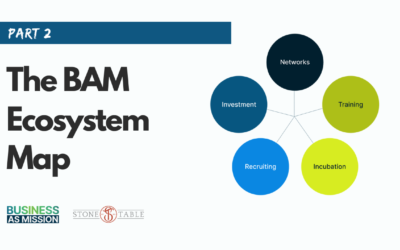Renewable Relationships: Why Missions to Unreached Peoples and Business as Missions Fit Perfectly Together

When I was a kid, the term “missionary” carried a particular mental image. It was usually some brave super-Christian living in the sub-Saharan wilderness preaching the mission to unreached peoples who lived in grass huts. I knew a few missionary families, which is how my young mind assumed they lived and worked. We were terrified God was going to ask us to join the mission to unreached peoples in that way, too. As kids growing up in the Midwestern Evangelical subculture, we even joked about it. “If I get too serious about my faith, I just know God is going to send me to Africa.”
An old tongue-in-cheek (and now seemingly insensitive by today’s standards) song by Scott Wesley Brown even put the sentiments to music:
Please don’t send me to Africa
I don’t think I’ve got what it takes
I’m just a man, I’m not a Tarzan
Don’t like lions, gorillas or snakes
I’ll serve you here in suburbia
In my comfortable middle-class life
But please don’t send me out into the bush
Where the natives are restless at night
What do you think of when you think of the mission to unreached peoples? Even if it’s not quite this over the top, I’m guessing your imagination doesn’t think anything about “business mission”, but instead, it conjures up more traditional preachers, big tent crusades, pastors of remote churches, or maybe indigenous Bible School teachers. And you’re not completely wrong. Once on a particular mission to unreached peoples, I actually spent the night in the Tanzanian bush with missionaries to the Datoog tribe. It was National Geographic Africa. Even the missionary joked that she was living out every Christian kid’s nightmare calling.
What is Ministry?
Instead of talking about the mission to unreached peoples, let’s bring the discussion more local. What do you think of when you think of a minister? Probably a preacher or someone who works for a church, right? Depending on your upbringing, perhaps you envision anything from clergy in a collar, to a preacher in a three-piece suit, to a hipster “Ted-talker” in skinny jeans and expensive tennis shoes. And again, you wouldn’t be wrong. The caricatures I’ve just described are genuine versions of pastoral ministers.
But what if I told you that the mission to unreached peoples includes many of today’s business mission-aries and ministers are standing behind coffee shop counters, operating Crossfit gyms, etc.. What if I said in the mission for the world, some are spearheading import/export businesses and running countless other forms of marketplace businesses?
While I’ve been an outspoken champion of the sacred function of ecclesiastical pastors and the vital role of proclamation in any kind of business mission work, a renewed focus on the marketplace is providing ministers and missionaries a perfect conduit for demonstrating and proclaiming the Gospel in the mission to unreached peoples. This really isn’t anything new. It’s been happening for millennia. The combination of a “Business mission” actually fits together quite nicely.
Beyond Pragmatism
My friend Dick Brogden, global leader of LiveDead (a pioneering missions movement focusing on the unreached people groups) and missionary to Saudi Arabia, sees Business mission and the marketplace as an overlooked tool in our mission to the world. I love how he characterized the marketplace’s role in the work they do amongst the mission to unreached peoples.
“I mean, I think we can discern just from common sense why you would have to use those types of methods. But, why is a “Business mission” actually an excellent way to engage people with the Gospel? It goes beyond pragmatism. So the pragmatic view [is], well, you can’t get into these countries or access these communities unless you have a credible platform.
That’s true. [You’re] less legitimate. So we do a “Business mission”, and we do it well to get visas and get into communities. But it goes beyond pragmatic to fruitful. If a typical person had no job or business, their mission to unreached peoples might be sharing the Gospel with their neighbor, or the guy they buy fruit from, or the landlord. But they’re not actually built to generate new relationships all day long so that they can keep sharing the Gospel so more people can get saved.
So, what happens if you share the Gospel with the guy that owns your flat and who you buy fruit from, and they reject it? Now, what? Is the mission to the unreached peoples around you over? Most people can’t just generate new relational context out of thin air. They need a “business mission”: a gym, coffee house, a language center, a tourist company, a consulting corporation. They need something that propels them into life on life, face-to-face conversations with people. And your mission to unreached peoples can’t just consist of sitting in a coffee shop all day long and thinking people are going to drop into your lap and say, “what must I do to be saved?”. You need that credible offering to get out into the renewable community.
That renewable content is significant. Why? Because so many people hear the Gospel and reject it. So, if you just don’t have a way to meet new people, your mission to the unreached peoples around you will not be fruitful. That’s why a “Business mission” is not just pragmatic but powerful. It’s continually propelling us into new conversations, relationships, and opportunities where we can proclaim Christ and find those who are interested and then drill down in discipleship with them.”
Demonstration and Proclamation
It seems that we swing the pendulum between two forms of evangelism that don’t need to be opposed to one another.
Some would say, “missions has always focused on preaching to people and ignores the real needs of the community. We need to stop talking and just love and serve people.”
Others would counter, “doing good by itself is not ‘missions.’ We have to declare the Gospel mission to unreached peoples with words.”
And both would be right! We don’t have to pit demonstration and proclamation against each other. In fact, all believers should be visible examples of Kingdom redemption in their neighborhoods no matter what culture they live in. All believers should proclaim the name of Jesus as part of that visual Kingdom demonstration. The marketplace provides a perfect platform for both the mission to the unreached peoples around us, as well as a “business mission”.
Through Business, missionaries serve a need, make an economic impact, employ people, and generate real value. And by default, those businesses create renewable relationships through which relationships can be built, and the Gospel can be proclaimed in the mission to unreached peoples around them. Demonstration and proclamation.
All over the world today, marketplace missionaries are intentionally integrating “Business mission” ministry to create a sustainable, missional presence of the kingdom of God in a particular community. Business and mission fit perfectly together, in your neighborhood and to the ends of the earth. It’s time to reclaim the marketplace as a sacred tool of God’s mission to unreached peoples.


